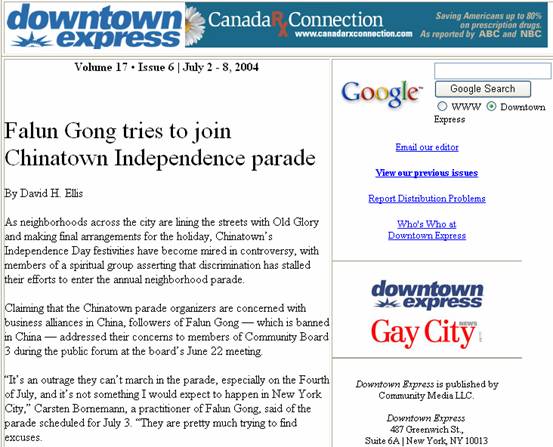As neighborhoods across the city are lining the streets with Old Glory and making final arrangements for the holiday, Chinatown's Independence Day festivities have become mired in controversy, with members of a spiritual group asserting that discrimination has stalled their efforts to enter the annual neighborhood parade.
Claiming that the Chinatown parade organizers are concerned with business alliances in China, followers of Falun Gong — which is banned in China — addressed their concerns to members of Community Board 3 during the public forum at the board's June 22 meeting.
"It's an outrage they can't march in the parade, especially on the Fourth of July, and it's not something I would expect to happen in New York City," Carsten Bornemann, a practitioner of Falun Gong, said of the parade scheduled for July 3. "They are pretty much trying to find excuses. "The main reason they give is a security issue because Falun Gong is controversial," he said. "In past years we've never had problems with the police. They are just looking for excuses to justify their decision."
Falun Gong, also known as Falun Dafa, is a form of qigong , a Chinese form of exercise and meditation dating back 3,000 years. Espousing values of truth, compassion and tolerance, the exact number of Falun Gong practitioners in New York City is difficult to estimate, since the group does not have an official organizing body. Some practitioners estimate their numbers in New York City at several thousand, with the majority of their members of Chinese descent. Falun Gong was founded in 1992 by Li Hongzhi, and the group now claims tens of millions of followers around the world.
Steven Wong, one of the parade organizers, said that the decision is ultimately up to the other participants in the parade, which will include about 160 community groups.
"I have to make sure how people feel about it," Wong said. "We try to execute everything where the majority makes the decision."
Last year's Independence Day parade was cancelled due to Chinatown's American Legion Post acceptance of Falun Gong without approval of the United Chinese Association and the Chinese Consolidated Benevolent Association, both of whom sponsored the event.
As one of the organizers of the parade during its inaugural year in 2001, Wong said many individuals are hesitant to let the group participate because their limited connection with the community and confusion over Falun Gong's beliefs and intentions.
"Personally I believe it's a new organization and nobody knows this group," Wong said. "They don't understand them and they feel uncomfortable with this group. I believe they should let people know about themselves."
Other individuals closely associated with Chinatown echoed Wong's belief that parade organizers are hesitant to admit the group because of some of the mystery surrounding the group.
"People don't have much understanding of them because there are so many controversies about them," said Edward Ma, a member of Community Board 2 and the Chinese–American Planning Council who was also skeptical of Falun Gong's source of funding and belief system. "They have to help people to understand. It is a sensitive area and it's something that people try to avoid since you might become labeled."
Wong feels that the criticism the group has directed at him is undue.
"I try not to take any position and then Falun Gong accuses me that I am taking orders," he said. "I don't think that is right and I think they are violating their slogan of truth, compassion and tolerance."
Falun Gong has been subject to criticism itself, being called a cult and for allegedly presenting homophobic messages. Members attribute their tarnished image to the Chinese government.
"That's just people who don't understand Falun Gong and the propaganda from the Chinese government," said Falun Gong Manhattan coordinator Scott Chinn, who has been a practitioner since 1999. "I know that through these principles I have more understanding of gay people. There's never been an incident of antigay sentiments from any practicing members."
For his part, Bornemann said that a Buddhist text dating back 100 years that is associated with Falun Gong may have some conservative, anti-gay sections, but that in its current practices, the group isn't homophobic. He said he has gay friends who do Falun Gong with him in Sara Delano Roosevelt Park and their sexuality hasn't been an issue at all.
However, the issue has been raised by community board members at both Community Boards 2 and 3 when Falun Gong members spoke during the public sessions, encouraging people to come out and try the exercise. After accusations of homophobia were raised, Board 3 recommended denying Falun Gong's request to put a banner in S.D.R. Park where they meditate. 
Original text from: http://www.downtownexpress.com/de_60/falungong.html





